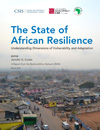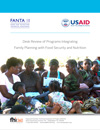-
‘State of African Resilience’ and a Review of Food Security-Family Planning Programs
June 24, 2015 By Schuyler Null In their first annual report, the ResilientAfrica Network (RAN), a partnership of 15 African universities, Tulane University, Stanford University, and the Center for Strategic and International Studies, outlines efforts to explore and define multiple “pathways of vulnerability” in sub-Saharan Africa. The report acknowledges that these pathways can be very different from place to place, but by working with African communities more closely, they hope to find new ways to break cycles of chronic crisis. One of the interventions piloted by Stanford was “deliberative polling,” which is based on the premise that communities are more likely to respond to development interventions if they understand the logic behind them and are involved in the process. In the densely populated Butaleja district of Uganda, the government is trying to steer people away from high-risk flooding zones. A randomly selected group of community representatives spent two days in deliberation with experts organized by RAN and were encouraged to pose questions about various policy options. Afterwards, participants were more likely to support efforts to prohibit settlement in vulnerable areas and, interestingly, more likely to support enforcement of the minimum age of marriage and girls’ education, reflecting new awareness of the connection between population pressures, family planning, and gender dynamics.
In their first annual report, the ResilientAfrica Network (RAN), a partnership of 15 African universities, Tulane University, Stanford University, and the Center for Strategic and International Studies, outlines efforts to explore and define multiple “pathways of vulnerability” in sub-Saharan Africa. The report acknowledges that these pathways can be very different from place to place, but by working with African communities more closely, they hope to find new ways to break cycles of chronic crisis. One of the interventions piloted by Stanford was “deliberative polling,” which is based on the premise that communities are more likely to respond to development interventions if they understand the logic behind them and are involved in the process. In the densely populated Butaleja district of Uganda, the government is trying to steer people away from high-risk flooding zones. A randomly selected group of community representatives spent two days in deliberation with experts organized by RAN and were encouraged to pose questions about various policy options. Afterwards, participants were more likely to support efforts to prohibit settlement in vulnerable areas and, interestingly, more likely to support enforcement of the minimum age of marriage and girls’ education, reflecting new awareness of the connection between population pressures, family planning, and gender dynamics. A new review by USAID’s Food and Nutrition Technical Assistance Project, requested by the Office of Population and Reproductive Health, provides the “first systematic effort…to examine the grey and published literature focusing specifically on nutrition, food security, and family planning integration.” Family planning integration is included as part of USAID’s Multi-Sectoral Nutrition Strategy 2014-2025, which aims to reduce chronic malnutrition, as measured by stunting, by 20 percent, and the review assesses how this has been done so far by examining 102 USAID-funded programs between 2003 and 2013. Family planning is most often included in food security and nutrition programs as part of a larger health package, the review finds, focused on maternal and newborn health and first 1,000 days of a child’s life. The authors recommend that USAID more clearly define what successful integration looks like (e.g., measurable improvements in both food security and family planning outcomes? Which food security and family planning outcomes?), harmonize reporting requirements, and give programs more time to fully integrate activities and see results. They would also like to see more testing of integration models and the development of technical guidance based on the best ones.
A new review by USAID’s Food and Nutrition Technical Assistance Project, requested by the Office of Population and Reproductive Health, provides the “first systematic effort…to examine the grey and published literature focusing specifically on nutrition, food security, and family planning integration.” Family planning integration is included as part of USAID’s Multi-Sectoral Nutrition Strategy 2014-2025, which aims to reduce chronic malnutrition, as measured by stunting, by 20 percent, and the review assesses how this has been done so far by examining 102 USAID-funded programs between 2003 and 2013. Family planning is most often included in food security and nutrition programs as part of a larger health package, the review finds, focused on maternal and newborn health and first 1,000 days of a child’s life. The authors recommend that USAID more clearly define what successful integration looks like (e.g., measurable improvements in both food security and family planning outcomes? Which food security and family planning outcomes?), harmonize reporting requirements, and give programs more time to fully integrate activities and see results. They would also like to see more testing of integration models and the development of technical guidance based on the best ones.Sources: Food and Nutrition Technical Assistance Project, ResilientAfrica Network.
 A Publication of the Stimson Center.
A Publication of the Stimson Center.





